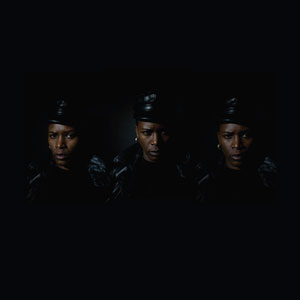Light Asylum Light Asylum
Let’s get one thing out of the way, first and foremost: Light Asylum, the debut […]

Let’s get one thing out of the way, first and foremost: Light Asylum, the debut LP from Brooklyn duo Light Asylum, is unceasingly, unflinchingly, unapologetically born of the ’80s. The record’s sound is so entrenched in the aural aesthetics of classic drum machines, analog synthesizers, and vintage genres (industrial/EBM, darkwave, and early synth-pop, mostly) that the music could be rightfully thought of as regressive. It’s almost as though singer Shannon Funchess and producer Bruno Coviello previously agreed on a set of rules and constraints—gated reverb on every snare hit, no obvious software plugins, hands off all machine presets, no “live” instruments, etc.—which they’d never stray from while working on their album’s 10 songs. Surprisingly or not, Light Asylum actually makes excellent use of the limited toolbox on its self-titled full-length, exhibiting a powerful range of moods and styles despite a more or less obsessive love for antiquated niche pop.
If one element could be held primarily responsible for Light Asylum‘s most successful moments, it’s Funchess’ incomparable voice. Nearly seven-minute centerpiece “Angel Tongue” is a prime example; the track maintains its playful, somewhat-naive vibe for three-quarters of its runtime until Funchess flips her performance into a defeated baritone, effectively transforming the remainder of the song into a sorrowful dirge. Her voice is also what makes opener “Hour Fortress” one of the album’s best cuts. As the machine-gun drum pattern trades punches with the bassline’s robo-groove à la Front 242, the vocalist delivers a jarringly low-register croon that sounds barely in key with the grittily fine-tuned production—a defining moment for a band whose strongest ability is effortlessly forging the strange and the sublime into a manageable pop tune. Later in the lead track, Funchess suddenly catapults her voice into the stratosphere, and delivers golden harmonies from an impressive height. It becomes obvious within the first three minutes of Light Asylum that you’re dealing with a commanding vocalist whose range seems practically unmatched.
Of course, Coviello’s production is also integral to the charm of Light Asylum’s vintage sound. He’s whittled the band’s instrumentation down to a sleek and slim arsenal, and creates impressive colors out of what otherwise might be a monochromatic swath of grey tones. It’s a testament to his technical abilities, ingenuity, and versatility that he can make such a sparse and ominous song like “Sins of the Flesh” and then come back with an operatic, neon-hued ballad like “Shallow Tears.” Even when Coviello indulges himself in a bit of unabashed ’80s kitsch (see: the Devo whip in socio-political tirade “IPC,” the horse neighs in the brilliant “A Certain Someone,” and the orchestra stabs in “Pope Will Roll”), you get the feeling that it’s done with less of a knowing wink than with his heart on his sleeve. As such, Light Asylum is the product of two very talented purists whose focus on a particularly stylish bygone era has actually surpassed its roots to sound unexpectedly modern.

